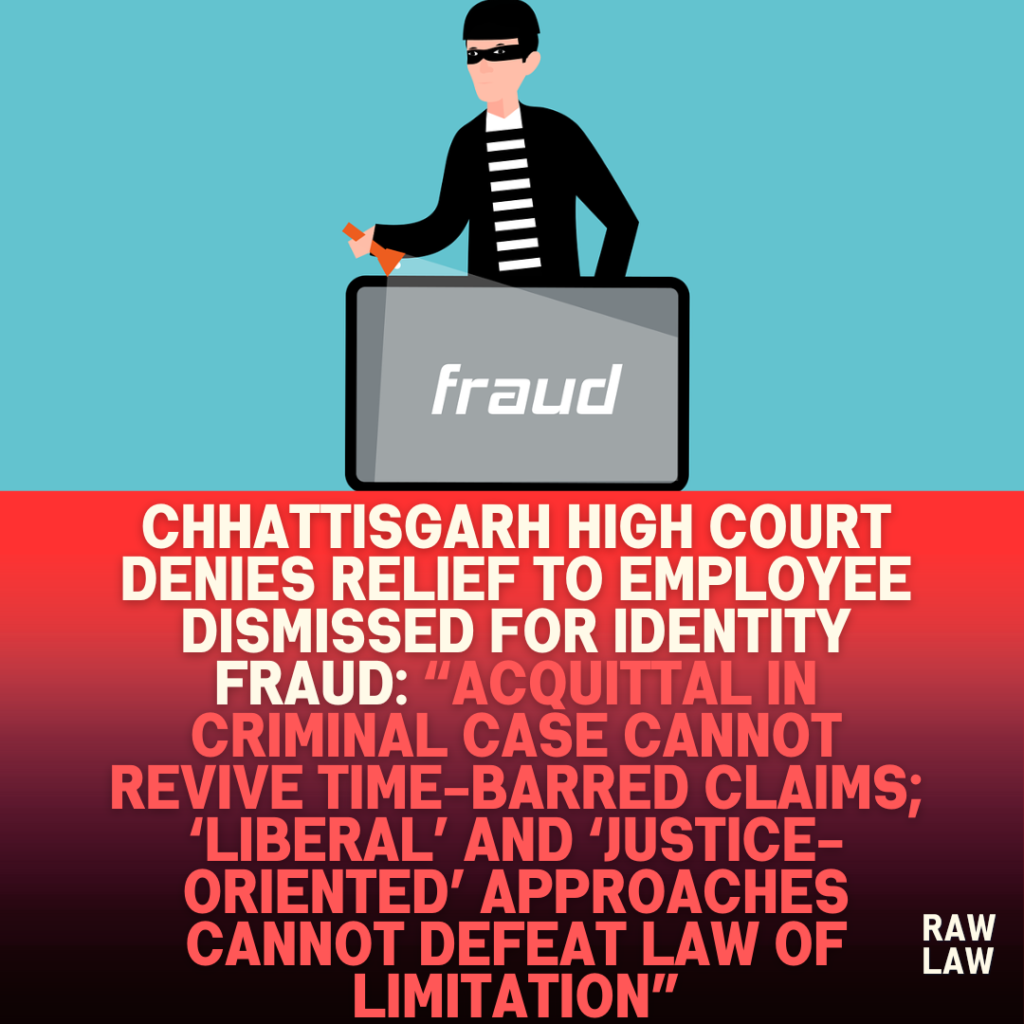Court’s Decision
The Chhattisgarh High Court dismissed a writ appeal challenging the order of the learned Single Judge, which had refused to interfere with the appellant’s removal from service on grounds of impersonation. The Division Bench upheld the view that claims raised after over 15 years without satisfactory explanation are barred by limitation. Relying on Pathapati Subba Reddy v. Special Deputy Collector (LA), the Court emphasized that:
“The phrases ‘liberal approach’, ‘justice-oriented approach’ and ‘cause for the advancement of substantial justice’ cannot be employed to defeat the law of limitation.”
Facts
The appellant was initially appointed as an emergency labourer at Bhilai Steel Plant on 16.11.1988 and was later promoted to Technician Level S-5 in 2007. However, on 22.06.2006, his sister-in-law lodged a complaint alleging that he had fraudulently obtained employment using the identity of her deceased husband, ‘Deepchand Pasi,’ while his real name was ‘Amirchand Pasi.’ This led to the registration of FIR under Sections 419 and 420 of the IPC. Subsequently, a departmental enquiry was initiated, which found the charges proved, leading to his removal from service on 12.12.2007.
The appellant was later acquitted in the criminal case on 13.09.2019. He issued a legal notice on 21.11.2020 seeking reinstatement and payment of back-wages and other consequential benefits amounting to ₹90 lakhs. The Labour Court dismissed his claim under Section 33(c)(2) of the CG Industrial Disputes Act, 1947 on 05.08.2022 due to it being non-maintainable. A fresh application under Section 31(3) read with Section 61 of the CG Industrial Relations Act, 1960 was filed in March 2023 and dismissed in October 2023 on grounds of limitation. His appeal before the Industrial Court was also rejected on 29.11.2024, leading to the writ petition and subsequent intra-court appeal.
Issues
- Whether the appellant’s long-delayed claims for reinstatement and back-wages after his acquittal in the criminal case were maintainable?
- Whether the learned Single Judge rightly rejected the writ petition on grounds of limitation?
Petitioner’s Arguments
The appellant argued that he was a layman with limited education and was unaware of legal recourses. He claimed to have pursued the criminal case diligently and only after his acquittal did he approach the respondents for relief. He contended that the Courts below erred in dismissing his claims merely on the ground of limitation without considering the continuous nature of his claim for back-wages and retirement benefits.
Respondent’s Arguments
The respondents contended that the appellant fraudulently secured employment by impersonating another individual. A departmental enquiry was lawfully conducted under Clause 29(iv) of the Plant’s Standing Orders, and the appellant was given full opportunity to defend himself. Despite removal in 2007, the appellant remained silent for 13 years. His first legal action came only in 2020. The respondents emphasized that the law mandates strict adherence to limitation and the appellant failed to satisfactorily explain the prolonged delay.
Analysis of the Law
The Court analyzed Section 62 of the CG Industrial Relations Act, 1960, which mandates that disputes relating to termination must be initiated within one year. It held that the cause of action arose in 2007 upon the appellant’s dismissal and not on his later acquittal in the criminal case. The Court reaffirmed that pendency of a criminal case does not extend the limitation period for approaching labour authorities or courts.
Precedent Analysis
The Court extensively relied on the Supreme Court’s judgment in Pathapati Subba Reddy v. Special Deputy Collector (LA) [(2024) 4 SCR 241], which consolidated earlier decisions and reiterated that:
- Limitation laws exist to bring finality to litigation.
- Courts cannot condone delay on equitable or sympathetic grounds alone.
- Merits of the case are irrelevant when considering condonation of delay.
- Delay cannot be excused merely because others in similar situations obtained relief.
The Court referred to the following precedents cited in Pathapati Subba Reddy:
- Maqbul Ahmad v. Onkar Pratap Narain Singh (AIR 1935 PC 85): No equitable relief against limitation.
- Brijesh Kumar v. State of Haryana (2014): Parity cannot justify belated claims.
- Lanka Venkateswarlu v. State of Andhra Pradesh (2011) 4 SCC 363: Liberal approach should not override statutory law.
- Basawaraj v. Special Land Acquisition Officer (2013) 14 SCC 81: ‘Sufficient cause’ must exclude negligence or inaction.
Court’s Reasoning
The Court noted that the removal order was passed on 12.12.2007 and that the appellant took no steps until 2020. Even after his acquittal in 2019, he failed to promptly act. It held:
“The pendency of the criminal case cannot be a ground to condone the delay when the cause of action arose in the year 2007 itself.”
The Division Bench found no illegality or perversity in the learned Single Judge’s reasoning that stale claims cannot be revived simply by invoking Section 5 of the Limitation Act.
Conclusion
The Chhattisgarh High Court dismissed the writ appeal, holding that the appellant’s delay of over 15 years in challenging his removal was wholly unexplained. His claim for back-wages and reinstatement was rightly barred by limitation.
Implications
This decision reiterates the principle that employees must act promptly to contest termination orders, especially when grounded in misconduct. An acquittal in a parallel criminal case does not revive employment rights if limitation bars the civil claim. The judgment also affirms the judiciary’s consistent approach against reopening settled matters on equitable grounds alone.
Also Read: Kerala High Court Dismisses Petition Challenging Stay on Domestic Violence Order



